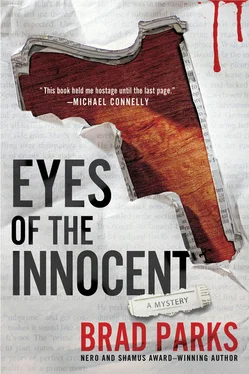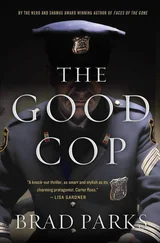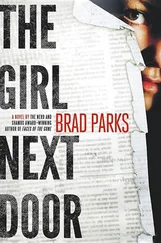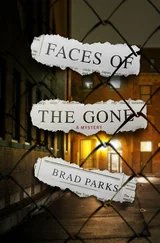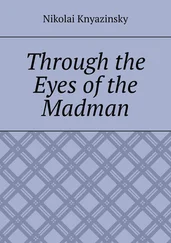Brad Parks - Eyes of the Innocent
Здесь есть возможность читать онлайн «Brad Parks - Eyes of the Innocent» весь текст электронной книги совершенно бесплатно (целиком полную версию без сокращений). В некоторых случаях можно слушать аудио, скачать через торрент в формате fb2 и присутствует краткое содержание. Год выпуска: 2011, ISBN: 2011, Издательство: Minotaur Books, Жанр: Триллер, на английском языке. Описание произведения, (предисловие) а так же отзывы посетителей доступны на портале библиотеки ЛибКат.
- Название:Eyes of the Innocent
- Автор:
- Издательство:Minotaur Books
- Жанр:
- Год:2011
- ISBN:0312574789
- Рейтинг книги:3 / 5. Голосов: 1
-
Избранное:Добавить в избранное
- Отзывы:
-
Ваша оценка:
- 60
- 1
- 2
- 3
- 4
- 5
Eyes of the Innocent: краткое содержание, описание и аннотация
Предлагаем к чтению аннотацию, описание, краткое содержание или предисловие (зависит от того, что написал сам автор книги «Eyes of the Innocent»). Если вы не нашли необходимую информацию о книге — напишите в комментариях, мы постараемся отыскать её.
Eyes of the Innocent — читать онлайн бесплатно полную книгу (весь текст) целиком
Ниже представлен текст книги, разбитый по страницам. Система сохранения места последней прочитанной страницы, позволяет с удобством читать онлайн бесплатно книгу «Eyes of the Innocent», без необходимости каждый раз заново искать на чём Вы остановились. Поставьте закладку, и сможете в любой момент перейти на страницу, на которой закончили чтение.
Интервал:
Закладка:
“How about this: if I can get the broker by eight, we run the story. After eight, it holds. Deal?”
“Fine,” Szanto said.
“Great,” I said, peeling out of his office before he could modify the arrangement.
I looked at the clock on the wall-6:07-and was actually feeling pretty good about things until I got back to my desk. That’s when I sat down and realized there was only one way I was going to find the goateed, shaved-headed, so-called Puerto Rican man: Go to the Baxter Terrace Public Housing Project after dark.
Don’t get me wrong, going to the projects any time of the day wasn’t exactly my idea of fun. There were certain dangers constant to Newark’s rougher projects-junkies were not known for keeping stringent track of time, and a junkie that needed money for a fix was always unpredictable. But at least during the day there were normal people out in the courtyards. Old ladies sat on stoops, kids played ball, mothers watched their babies. The dealers were still around, sure, but the regular folks could maintain at least a modicum of social order. It didn’t matter how hardcore a gangbanger was, he still respected a grandma-his own or someone else’s-sitting on a stoop.
But then, after dusk, the old ladies, kids, and moms would go inside, fully surrendering the turf to more insidious elements. The dealers. The gangs. The vagrants. People whose interests clearly tended toward the antisocial. There something primeval about what the darkness did to a city like Newark.
About the only thing I had going for me was the element of surprise. Absolutely no one expected to see a well-dressed white man striding confidently into the middle of that environment. Sometimes I could actually see guys startle as I rounded a corner. As long as I kept moving-and didn’t stay long enough for them to recover from shock-I really had nothing to worry about.
Or at least that’s what I kept telling myself as I went down to my Malibu and got it rolling in the direction of Baxter Terrace.
Slated for a demolition that was forever being delayed for one reason or another, Baxter Terrace was among the last of Newark’s bad, old projects-a relic of the failed experiment that was high-density public housing. When it was first built in the 1930s, people clamored to get into Baxter Terrace. It was segregated, of course-blacks lived on one side of Orange Street, whites on the other-but desired by both races. Tenants were chosen only after careful consideration by the tenants’ association.
After moving in, the residents-all of whom had jobs and made timely rent payments-were responsible for much of the maintenance. They cleaned the hallways and stairwells. They swept the sidewalks. They kept gardens full of flowers. The Newark Housing Authority, which owned and managed the properties, watched closely, evicting anyone who failed to toe the line. A resident who left for work without cleaning their dishes might come home to a note from the superintendent warning them not to let it happen again: dirty dishes might attract bugs.
It’s difficult to say whether the housing authority or the tenants were more responsible for the decline from that golden era of public housing. But sometime during the late 1950s, the quality of the tenants began slowly declining, with more on public assistance-and fewer who cleaned, planted gardens, or paid rent-every year. Management became less conscientious about the white glove inspections, which allowed tenants to become even more slovenly. The housing authority fell further under the sway of City Hall, which was becoming increasingly corrupt, and many of the cleaning jobs were of the no-show variety.
Plus, as fewer tenants paid rent, the housing authority had less of a budget for maintenance. And once you start to let things slide in a high-density housing situation, they go in a hurry. The rats, mice, and roaches get a foothold almost instantly. The garbage piles up. The small leaks turn into big ones.
The tenants’ association complained as things got worse, and the bosses at the housing authority eventually got tired of hearing it. So they busted up the tenants’ association.
That meant the tenants were no longer picking their own neighbors, which brought even more decline in the quality of the people moving in. Rent collection dropped further, which meant even less money for maintenance. And the tenants-who no longer had any collective voice or empowerment through which to improve conditions-stopped caring about the buildings, which only strengthened the various negative feedback mechanisms already in place.
Which was how you ended up with stairwells that smelled of urine, booze, and rat droppings; hallways that hadn’t seen a mop in years; and apartments where the humans fought an ever-losing battle with the pests that had taken up residence.
Perhaps the most apt description of Newark’s housing projects I’ve read came from No Cause for Indictment, a book by Ron Porambo about the Newark riots, which described the projects in the late 1960s: “If never visited, these dwellings cannot be imagined. Once seen, they can never be forgotten.”
And, if anything, the last forty years had only made them worse.
* * *
I parked my Malibu at the fringes of the projects, then plunged into the haystack to begin looking for the needle. It had been more than three years since Akilah Harris encountered this guy. He could be anywhere by now. Or he could be around the corner.
My entrance into the courtyard caused a small stir among the lookouts. I could tell because in the middle of February, in the dark of night, Baxter Terrace suddenly sounded like an Audubon Society refuge-birdcalls being the latest in urban drug-selling counterintelligence.
As had been explained to me by a dealer I got friendly with not long ago, the old alert system was very limited in what it allowed. If a lookout saw something that didn’t look right-whether it was a cop or just a well-dressed white guy like me-he did the same thing: he yelled “cops” or the radio code for an officer, “five-oh,” and everyone scattered. The guy sitting on the stash was forced to abandon his perch, making it vulnerable to being swiped by anyone who might have seen where it was hidden.
Birdcalls allowed much more information to be imparted to other members of the operation, without the visitor being aware of what was being communicated. So while a crow’s harsh cry could harken the arrival of a member of the city narcotics unit-a significant threat-the sweet song of a chickadee might signal an officer who was merely escorting a social worker to an appointment, allowing business to continue in guarded fashion. Someone like me, a stranger on unknown business, might warrant a whippoorwill’s call.
Where exactly a city kid learned what a whippoorwill sounded like, I have no idea. But these kids were nothing if not resourceful. It makes you wonder what they could have accomplished under different circumstances.
And now I needed their help. If anyone would know my mortgage hustler, it would be the drug hustlers who worked the same turf, albeit different clientele. My only other alternative would be to knock on doors until I found someone who knew the guy. But given what you often found behind those doors-the frightened, the aged, the mentally ill, the belligerent, the chemically addicted-I would be better off trying to work the dealers than to waste time on trial and error.
As I pressed farther into the courtyard, the birdcalls quieted down to a mild chatter. By now, everyone who needed to be aware of my arrival had been apprised. And yet, while they obviously knew where I was, I couldn’t see them. It was too cold for anyone to just be hanging out. I dug my hands into my pockets and kept peering into the darkness.
Finally, two figures emerged from one of the corner buildings. I took my hands out of my pockets-no need for them to think I was armed-and walked toward them. They were both late teens from the look of them. One was tall and slender, with a head full of thick braids jutting from under a stiff-brimmed black cap. The other was shorter, with a hooded sweatshirt pulled over short-cropped hair.
Читать дальшеИнтервал:
Закладка:
Похожие книги на «Eyes of the Innocent»
Представляем Вашему вниманию похожие книги на «Eyes of the Innocent» списком для выбора. Мы отобрали схожую по названию и смыслу литературу в надежде предоставить читателям больше вариантов отыскать новые, интересные, ещё непрочитанные произведения.
Обсуждение, отзывы о книге «Eyes of the Innocent» и просто собственные мнения читателей. Оставьте ваши комментарии, напишите, что Вы думаете о произведении, его смысле или главных героях. Укажите что конкретно понравилось, а что нет, и почему Вы так считаете.
